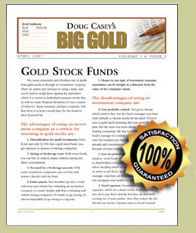Casey Files:
 Kuwait Breaks
the Peg Kuwait Breaks
the Peg
By David Galland,
Managing Editor,
BIG
GOLD from CaseyResearch.com
Jun 4, 2007
Years ago, I recollect hearing
a successful currency speculator say that if you wanted to know
what a government is going to do with its currency, listen to
what they say they aren't going to do... then expect the opposite.
On March 3, 2007, for instance,
we had the following report out of Bloomberg.
Saudi Arabia, the United Arab
Emirates and four other Persian Gulf nations will discuss revaluing
their currencies' peg to the U.S. dollar before a proposed monetary
union in the region in 2010.
The states would only change
the dollar peg simultaneously, U.A.E. Central Bank Governor Sultan
Bin Nasser al-Suwaidi told reporters today. The six countries
form the Gulf Cooperation Council and their central bank officials
next meet in April. The other countries are Bahrain, Qatar, Oman
and Kuwait.
"We will not act unilaterally,''
al-Suwaidi said in Dubai, U.A.E.
On March 15, Bloomberg followed
up with this...
The dollar may also be buoyed
after the six Gulf Cooperation Council members, which include
Saudi Arabia and Kuwait, agreed not to revalue their currencies
against the U.S. currency.
"We have no plans to revalue,''
Hamad Saud al-Sayari, the governor of the Saudi Arabian Monetary
Agency, told reporters in Dubai today. "The U.S. dollar
is still very important to us.''
Apparently, someone forgot
to copy the Saudis on the memo, because on March 20, Kuwait announced
that it was tossing the dollar peg over the side and replacing
it with a basket of currencies.
This will almost certainly
lead to a domino effect in the Middle East, a move that would
likely be warmly welcomed by the local citizenry there, and not
so warmly welcomed by those in the U.S. government charged with
maintaining the U.S. dollar hegemony.
And Then There's China...
On announcing last year that
it was forming a new agency to help better manage its foreign
reserves, China took pains to assure the markets that they were
not doing so in order to begin unloading dollars. But then on
May 18, it announced it was going to invest $3.3 billion in Blackstone,
a private equity group.
Now, you can be assured that
Blackstone is going to go all out to impress their deep-pocketed
new partner. And it won't impress them very much if they only
buy U.S. stocks that have to then fight against the tide of a
depreciating dollar.
In our view, this is just the
beginning of a much larger strategy, the core of which will be
trading out of U.S. treasury bills and into all manner of other
investments... an international basket of stocks, natural resource
deposits around the globe... pretty much anywhere and anything
offers the prospect for a higher return with lower currency risk.
Or, if the currency risk is
going to be taken, then the potential returns will have to offset
those risks. Earning a 4.5% yield on a Treasury bond while taking
a 10%, 20% or even 30% risk on the dollar doesn't make a lot
of sense to us. And, we expect, neither does it to the Chinese.
There are some very interesting
implications in all of this. For instance, if the Chinese slow
down their buying of Treasuries in favor of other asset classes,
who is going to step up to take their place?
Of course, at the right interest
rate, far higher than those on offer today, someone will. But
then there's that whole collapsing housing bubble thing.
The U.S. continues to be trapped
on the horns of a dilemma, wedged squarely between a rock and
a hard place. Raise interest rates to head off a devastating
mass exodus from the dollar and sink the economy... or, lower
interest rates to keep the economy afloat and doom the dollar.
Or, simply continue printing
money like there's no tomorrow, steadily devaluing the $6 trillion
in the hands of foreigners, and hope no one will notice.
There are times, like today,
that any reasonably astute observer can look to the horizon and
see what's coming. A monetary crisis is headed in our direction,
and the pace of its arrival is, in our view, quickening.
Gold, and for more pep in your
portfolio, gold stocks, are no longer an option but a prerogative
- even for conservative investors.
Meanwhile, pay close attention
to the comments of high government officials about their intentions
on the dollar...
David Galland
is the managing editor of BIG
GOLD,
a new publication from Casey Research dedicated to helping investors
profit from the developing bull market in precious metals--with
an easy-to-maintain portfolio of conservative mid- to large-cap
gold producers and near-producers. You
can learn about BIG GOLD and its unusual 3-month money-back guarantee
by clicking right here.
Doug Casey

Casey Archives
321gold Ltd

|